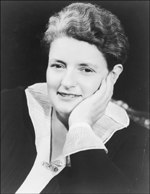In 1937, she launched on the CBS radio network the first of a series of similar and successful shows, under her own name, as Mary Margaret McBride. She interviewed figures well known in the world of arts and entertainment, and politics. Topics discussed on her show included prostitution, unwed mothers, marriage in the modern world, and pioneering women. For women of that era it was an alternative to the afternoon radio soaps. It's success proved that women’s interests ranged beyond cleaning tips and recipes. She forged the very crucible from which Oprah and all the others proceeded.
A radical liberal for her time, she had African American guests as early as WWII. This was so unusual at the time that the practice was called "breaking the color line." Those high-profile guests included civil rights figures such as Zora Neale Hurston, and Grace Nail Johnson. In the fall of 1948, she and NBC attempted to lure her across the street to debut on television, but wasn't interested.
She had a good deal at ABC, accepting advertising only for products she was prepared to endorse from her own experience, and turned down all tobacco or alcohol products. She eventually did cross the street to NBC in 1940 but still on the radio. Her NBC show in the 1940s had broad  range of guests, from politicians to generals to movie stars. During the run of the program, she interviewed over 1200 people, including even then President Harry Truman. A little more than ten years later she branched out, picking up her own syndicated newspaper column for the Associated Press. She also wrote for such magazines as Cosmopolitan, The Saturday Evening Post, and Good Housekeeping. Amidst all this multitasking she even wrote two books for teen
range of guests, from politicians to generals to movie stars. During the run of the program, she interviewed over 1200 people, including even then President Harry Truman. A little more than ten years later she branched out, picking up her own syndicated newspaper column for the Associated Press. She also wrote for such magazines as Cosmopolitan, The Saturday Evening Post, and Good Housekeeping. Amidst all this multitasking she even wrote two books for teen  girls.
girls.
As radio hosts do, her popularity waned and she appeared in smaller radio media markets. At the end of her life she was still broadcasting three times a week from the living room of her home in upstate New York. She died April 7, 1976. Click here for an MP3.
In 1984 RKO General, Inc., donated the complete archives of WOR. The collection offers thousands of hours of programming but more importantly, the Mary Margaret McBride NBC Collection.http://www.coutant.org/mcbride.html





No comments:
Post a Comment